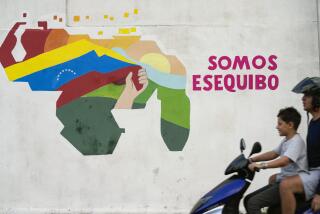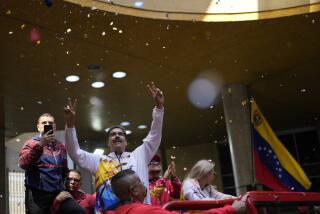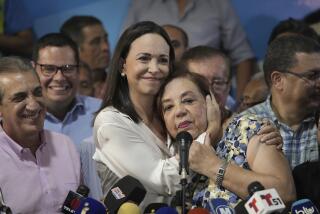Fidel Chavez?
VENEZUELA’S presidential election last month might have been free and fair, but it’s increasingly unlikely that its next one will be. President Hugo Chavez has apparently taken his landslide victory as a mandate to impose an authoritarian socialism on his nation that looks frighteningly like the model created by his idol, Cuba’s Fidel Castro. If his drive to consolidate power over the media, the telecommunications industry and other sectors succeeds, by the time his term expires six years from now it may no longer be possible to hold a free election in Venezuela.
Chavez’s plan to nationalize the country’s biggest telecommunications and electricity companies, announced Monday and reiterated during his inauguration Wednesday, will exact a heavy toll in the coming years. Aside from the immediate damage from foreign investors fleeing the country, these enterprises almost certainly will be diminished and bled dry by government bureaucrats eager to dole out money and patronage. This is already happening in Venezuela’s oil industry.
Chavez also seems intent on destroying Venezuela’s civil society. He already controls all three branches of government, with all 167 seats of Congress held by lawmakers allied to Chavez and with the Supreme Court stacked with loyalists. After his reelection, he announced plans to merge his coalition of allied parties — effectively creating a one-party state — and to pursue a constitutional amendment ending presidential term limits, meaning he could run indefinitely.
Now he’s setting his sights on a critical barrier to totalitarianism: the independent media. Last month, Chavez announced that he wouldn’t renew the license of Radio Caracas Television (RCTV), which has been highly critical of his regime. His justification was a law passed in 2004 that allows for non-renewal of a broadcast license if its holder is guilty of such things as promoting disruption of public order or endangering national security. RCTV’s crime, apparently, was to celebrate the botched coup attempt against Chavez in 2002.
Any criticism of Chavez or his henchmen can now be interpreted as disrupting public order, and Venezuela also has passed harsh libel laws aimed at curbing “disrespect” of government officials. Though RCTV is just one of many opposition media outlets, Chavez has sent a chilling message to the rest that he can shut them down at any time.
A country without an independent media, judiciary or legislature is by nobody’s definition a democracy. Venezuela’s people may just have succeeded in voting themselves out of power.
More to Read
Start your day right
Sign up for Essential California for news, features and recommendations from the L.A. Times and beyond in your inbox six days a week.
You may occasionally receive promotional content from the Los Angeles Times.






